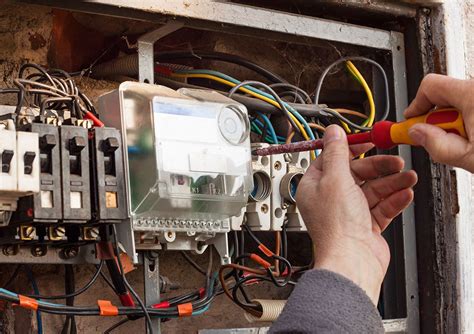Leading Tips for Effective Electrical System Troubleshooting
Fixing electric systems requires a systematic method, based in a thorough understanding of electrical principles and safety and security procedures. By acquainting oneself with circuit parts, using necessary devices, and sticking to an organized evaluation approach, specialists can effectively determine and settle issues. Nevertheless, the nuances of reliable repairing expand past plain technological knowledge; recognizing exactly how to document findings and focus on safety can dramatically affect outcomes. As we discover these vital components additionally, it becomes clear that grasping this process is not simply helpful but vital for success in the field.
Understand the Essentials
Understanding the essentials of electric systems is essential for efficient troubleshooting, as a solid structure allows technicians to diagnose and settle concerns a lot more efficiently. A detailed grasp of electric principles, such as voltage, present, resistance, and power, is vital in determining the root triggers of troubles. Voltage is the electric prospective difference that drives current with a circuit, while resistance opposes the circulation of current, impacting the general functionality of the system.
Knowledge with circuit components, consisting of resistors, capacitors, diodes, and changes, is also critical. Each component plays an unique duty in circuit habits and can impact efficiency when malfunctioning. Furthermore, recognizing series and identical circuit setups is important, as these setups affect the distribution of voltage and existing within the system.
Service technicians have to be conscious of potential threats, such as shock and short circuits, to execute risk-free troubleshooting methods. By mastering these foundational principles, specialists improve their ability to conduct efficient diagnostics and repairs, inevitably leading to boosted performance and integrity of electric systems (electrical system troubleshooting).
Gather Necessary Tools
Effective troubleshooting of electrical systems needs the best collection of tools to detect and solve issues accurately. Important tools include a multimeter, which determines voltage, present, and resistance, allowing for precise examinations of electrical elements.
In addition, shielded hand devices such as screwdrivers, pliers, and cable strippers are important for safely manipulating electric links. It is likewise advisable to have a circuit tester handy to confirm the existence of voltage in electrical outlets and cords. For more complicated systems, a thermal imaging cam can aid detect overheating components, showing potential failings.

Adhere To a Methodical Approach
Having actually collected the proper devices, the following action in repairing electrical systems is to comply with a methodical strategy. A methodical approach ensures that professionals can determine mistakes effectively and properly, minimizing downtime and protecting against unneeded repair services.
Begin by assessing the system's schematic representations and specs. Comprehending the design and operational parameters will certainly give context for detecting issues. Next, isolate the issue location by making use of a process of removal. This entails monitoring each part methodically, beginning with the power source and working in the direction of the tons.
Make use of testing equipment, such as multimeters and oscilloscopes, to collect unbiased data regarding voltage, current, and resistance at different factors within the system. This empirical proof will certainly guide your troubleshooting efforts and you can try this out help to confirm or remove possible causes of failing.
Additionally, take into consideration ecological variables that might affect the system's efficiency, such as temperature fluctuations or wetness access. A thorough assessment of circuitry, connections, and components will make certain that all possibilities are accounted for.
Paper Your Searchings For
Thorough paperwork is essential in the troubleshooting procedure of electrical systems. This practice not only aids in comprehending the origin reason of the problem yet also offers as a referral for future troubleshooting initiatives.

In addition, preserving a log of components changed or repair work executed is indispensable. This info sustains inventory administration and can assist evaluate the long life and dependability of specific parts.
Ultimately, the documents procedure ought to be comprehensive yet concise, enabling very easy access and review - electrical system troubleshooting. By focusing on detailed paperwork, professionals can develop a useful knowledge base that not just aids in existing troubleshooting however additionally empowers future upkeep efforts, thereby boosting general system reliability

Prioritize Precaution
Acknowledging the integral risks linked with electric systems is important for ensuring safety throughout troubleshooting. Electrical shock, burns, and equipment damage are just a few of the potential hazards that technicians deal with. Prioritizing precaution is not only a lawful obligation yet also a moral vital that safeguards both the professional and the surrounding setting.
Prior to commencing any kind of troubleshooting task, service technicians should wear ideal personal protective devices (PPE), consisting of protected handwear covers, safety glasses, and flame-resistant garments. Ensuring that the workspace is dry and devoid of clutter can dramatically reduce the risk of crashes. Moreover, it is important to de-energize circuits prior to beginning any kind of work, validating that they are not endure making use of a multimeter or voltage tester.
Developing clear communication procedures with group participants is likewise crucial; this makes sure that everybody understands prospective dangers and the condition of the electrical system being worked with. Having an emergency feedback plan in location can confirm important in the occasion of an incident. By prioritizing precaution, service technicians can effectively reduce risks and foster a more secure workplace.
Conclusion
Effective electric system repairing depends on a thorough understanding of basic review concepts and a methodical technique. Focusing on safety measures makes sure the wellness of people entailed and the honesty of the electrical system.
Comments on “Comprehensive electrical system troubleshooting you can trust.”